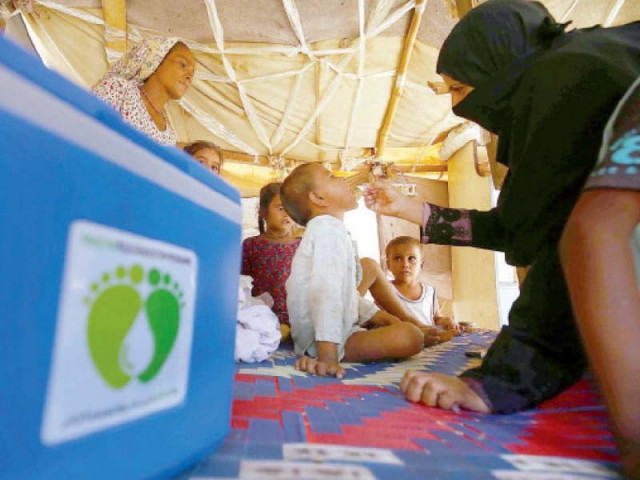UN agencies brought back for vaccine plan
Govt reverses 2-month-old decision taken by earlier ECNEC meeting

In a fiscally imprudent decision, the interim federal government on Monday took back the responsibility of a $1.8 billion polio eradication programme and also brought back two United Nations agencies for its implementation by reversing a two-month-old decision.
The newly reconstituted Executive Committee of the National Economic Council (Ecnec), in its maiden meeting, undone the decision of the previous Ecnec in which the role of the federal government had been limited to just one year in implementation of the national polio eradication programme.
Under the constitution, health is a provincial subject but the federal government is spending in this area despite having no fiscal space.
Interim Finance Minister Dr Shamshad Akhtar said last week that there was no fiscal space available with the federal government to give any subsidies.
Read Business confidence plummets as default looms
Ecnec considered and approved the Emergency Plan for Polio Eradication at a cost of $1.78 billion including a grant of $1.2 billion from GPEI partners, a loan of $552 million from the Islamic Development Bank and a loan of $35 million from AFD, according to a statement issued by the Ministry of Finance.
Earlier, Ishaq Dar-led Ecnec had given provinces a role in implementation of the $1.8 billion programme. However, Shamshad Akhtar-led Ecnec brought the United Nations Children’s Fund (Unicef) and the World Health Organisation (WHO) back into implementation of the programme. The project would supply polio eradication vaccines all over Pakistan and would be executed by WHO and Unicef, said the finance ministry.
Ecnec agreed that the duration of the umbrella PC-I would be three years and authorised the Economic Affairs Division (EAD) to enter into loan agreements to finance the project. As a result, the federal government has taken financial responsibility of the three-year, $1.8 billion polio eradication programme.
In July this year, the Dar-led Ecnec decided that provinces would be responsible for the programme and prepare PC-Is within one year. It would be their responsibility to acquire loan and pay back liability directly. The provincial PC-Is would explicitly depict their share of loan, which shall be re-lent to the provinces from the very outset of the implementation of PC-Is, according to the July decision.
However, the Ministry of Health secretary requested last week that Ecnec’s two-month-old decision should be reversed and the federal PC-I duration should be extended to three years to make it aligned with the IDB loan agreement. The secretary also requested that the responsibility of implementation strategy should rest with Unicef and WHO by withdrawing it from provinces.
In July this year, Planning Secretary Zafar Ali Shah informed Ecnec that despite a $587 million loan being spent, the poliovirus could not be eradicated and “the disease still exists with constant reporting of new cases and the destination to eradicate polio is far from near”.
Read More Pakistan eyes $25b Saudi investment
“As the loan and grants are channeled directly to Unicef and WHO without getting entry into government accounting system, therefore, the loan amount to the tune of $487 million acquired so far is not re-lent to provinces,” stated Shah in the Ecnec meeting of July.
The planning ministry was also of the considered view that with Unicef and WHO as in charge of the programme, the goal of “polio-free Pakistan” could not be achieved. The programme is planned to be implemented from 2023 through 2026. Partner UN agencies, WHO and Unicef, charge a handsome amount as administrative expenses to the government of Pakistan.
The objectives of the programme are said to eliminate cVDPV2 through the delivery of effective vaccines, to stop WPV1 transmission in all remaining reservoirs through focused, intensified national efforts, and to rapidly detect, contain, and eliminate all types of polioviruses.
Published in The Express Tribune, September 5th, 2023.
Like Business on Facebook, follow @TribuneBiz on Twitter to stay informed and join in the conversation.



1733130350-0/Untitled-design-(76)1733130350-0-208x130.webp)















COMMENTS
Comments are moderated and generally will be posted if they are on-topic and not abusive.
For more information, please see our Comments FAQ